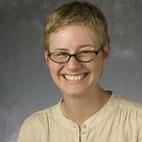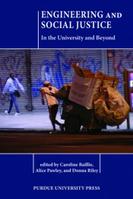Newly Published: Engineering and Social Justice: In the University and Beyond
Engineering and Social Justice: In the University and Beyond (Purdue University Press, 2012) presents the outcomes of scholarly research in a user-oriented style, inviting readers to think and teach in new ways that acknowledge the social, as well as technical, impact that engineering can have on our world and that open possibilities for social justice movements to help shape engineering and technology.
Pawley's chapter—"What Counts as 'Engineering'? Toward a Redefinition"—presents the metaphor of borders and boundaries through which to analyze women's participation in engineering. "I'm interested in how engineering faculty make decisions about what counts as engineering and why, and how their judgments are manifested in their teaching, research, and service activities," she says. Engineering is commonly characterized as problem-solving, but generally only in a high-tech, first-world, for-profit context. "Problems that are low-tech, third-world, about the work of unpaid laborers—often women—aren't the subjects of engineers' attention," Pawley says. "I see that as problematic."
Baillie contributed a chapter—"Waste for Life: Socially Just Materials Research"—on the challenges of working with Argentina's cartoneros ("cardboard pickers") to co-develop and apply poverty-reducing technologies for repurposing scavenged waste. Riley's chapter, "An Alternative Tour of Ford Hall: Service Toward Education and Transformation," takes a social-justice perspective in telling the story of Smith College's first building to be named for a corporation. (Riley was on sabbatical at Purdue in 2009.)
Contributions by ENE faculty, graduate students, and staff are these:
Karl Smith: Foreword: "Reflections on engineering and social justice in teaching, learning, and research"
Monica Cardella, Carla Zoltowski, Bill Oakes: Chapter 1: "Developing human-centered design practices and perspectives through service learning"
George Ricco, Matt Ohland: Chapter 2: "An ethnographic study of social justice themes in engineering education"
Alice Pawley: Chapter 3: "What counts as 'engineering'?: Toward a redefinition"
Michele Strutz, Marisa Orr, Matt Ohland: Chapter 7: "Low socioeconomic status individuals: An invisible minority in engineering"
Matt Ohland, Maria Orr, Russell Long, et al.: Chapter 8: "Viewing access and persistence in engineering through a socioeconomic lens"
Other contributors include George Catalano, Lisa McLoughlin, Valerie Lundy-Wagner, and Cindy Veenstra. Covering research using a breadth of methods—quantitative, qualitative, ethnographic, reflective pieces—Engineering and Social Justice: In the University and Beyond is an essential reader for the U.S. engineering academic who wants to develop engineering graduates, as well as technologies and practices, that are non-oppressive, equitable, and engaged.


